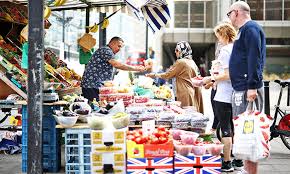UK inflation pressures remain, reducing chance of August rate cut

London: British inflation held at 2 per cent in June, defying forecasts for a slight fall, and strong underlying price pressures prompted investors to scale back bets that the Bank of England (BOE) would cut interest rates for the first time since 2020 in August.
Increases in hotel prices – in a month when US pop star Taylor Swift and other performers toured Britain – were partly to blame for the higher-than-expected inflation number, underscoring the BOE’s concern about services prices.
Mr Ian Stewart, chief economist at Deloitte, said Britain’s once-towering headline inflation was now lower than in the US and the euro area after past jumps in food and energy prices fell out of the numbers, but this looked temporary.
“A pick-up in UK activity since the start of the year means that the service sector is generating quite high levels of inflation,” Mr Stewart said. “That suggests the Bank of England has limited scope to cut rates this year.”
Economists had mostly expected headline consumer price inflation would ease to 1.9 per cent in the 12 months to June, extending its drop from a peak of 11.1 per cent in October 2022.
Inflation for services was 5.7 per cent, the Office for National Statistics (ONS) said, unchanged from May. A poll pointed to a slightly weaker 5.6 per cent increase.
Investors pared back bets on a BOE rate cut on Aug 1, the date of its next scheduled monetary policy announcement, to about 35 per cent, down from just under 50 per cent before the data. Sterling rose by about a quarter of a cent against the US dollar to its highest in a year at just over US$1.30.
The BOE took comfort from May’s fall in consumer price inflation to its 2 per cent target for the first time in nearly three years. But it has expressed concern about the strength of services inflation, which largely reflects pressure from wage growth in a labour market short of candidates to fill jobs.
Deutsche Bank chief UK economist Sanjay Raja said the increase in hotel prices might reflect the Taylor Swift tour. Although this rise could well reverse in July’s data, overall, July 17’s inflation numbers would not be encouraging for the BOE.
“We now think that an August rate cut is finely balanced. A lot will now depend on the strength of the May wage and unemployment data,” he said.
Data due on July 18 is expected to show wages are still rising by almost 6 per cent a year – roughly double the rate that would be compatible with keeping inflation at 2 per cent.
An interest rate cut on Aug 1 would give an early boost to new Prime Minister Keir Starmer and his finance minister, Ms Rachel Reeves, after a landslide election victory two weeks ago.
The new government’s legislative agenda – including its plans to boost economic growth – is due to be announced in Parliament later on July 17.
But on July 10, BOE chief economist Huw Pill said the timing of the first rate-cut remains an open question. On July 16, the International Monetary Fund’s chief economist, Professor Pierre-Olivier Gourinchas, said services inflation in Britain, like in the United States, was likely to prove sticky.
Core inflation – excluding volatile food and energy prices – held at 3.5 per cent in the 12 months to June, the ONS said, matching the median forecast in a poll.
The BOE had expected headline inflation of 2 per cent in June and services inflation of 5.1 per cent, according to forecasts it published two months ago. The BOE also expected headline inflation to rise back above its target later in 2024 and through 2025.
The ONS said upward pressures on headline inflation in June included a smaller fall in the costs of second-hand cars than in June 2023, as well as the increase in hotel prices.
But clothing prices fell as retailers resorted to discounting to entice shoppers still feeling the impact of a cost-of-living squeeze and wetter-than-usual summer weather.





